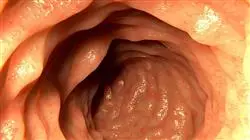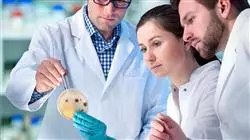University certificate
The world's largest faculty of nutrition”
Introduction to the Program
The study of the Intestinal Microbiota opens a door to the knowledge of multiple diseases, bringing great value to the Nutritionist's curriculum, who will be able to design diets much more adapted to the characteristics of these patients"

Numerous pieces of scientific evidence have implicated the intestinal microbiome and its metabolic potential in various pathological conditions in recent years, giving rise to new therapeutic strategies to control and regulate this ecosystem. The study of this ecosystem is a field that is rapidly advancing scientifically, and it is universally accepted that to achieve an adequate state of health it is also necessary to have a "healthy" Microbiota.
The human microbiota undergoes changes as a consequence of the influence of multiple factors, diet, lifestyle, pharmacological treatments.... generating alterations in this bacterial ecosystem and the abnormal interaction that the organism could have with it, is related to certain processes: allergic, acute and chronic intestinal diseases, obesity and metabolic syndrome, neurological diseases, dermatitis and other alterations in the dermis, and even some types of cancer.
This Postgraduate certificate in Microbiota and Intestinal Dysbiosis focuses on providing nutritionists with the necessary information on issues related to the Intestinal Microbiota, paying special attention to those cases in which Dysbiosis occurs and the problems related to them.
In the same way, the use of Probiotics and Prebiotics and the growing market launch of new products with very specific strains for problems and diseases of the intestinal tract will also be addressed.
All this content will enable nutrition professionals to be prepared to offer effective nutritional solutions for patients with this type of pathology, knowing how to guide them so that they can recover and maintain their Intestinal Microbiota through a good diet and, consequently, promote a good state of health.
TECH provides you with the latest knowledge on Intestinal Microbiota so that you can become a successful Nutritionist"
This Microbiota and Intestinal Dysbiosis for Nutritionists in Microbiota and Intestinal Dysbiosis for Nutritionists contains the most complete and up-to-date scientific program on the market. The most important features of the program include:
- Development of practical cases presented by experts in Intestinal Microbiota
- The graphic, schematic, and eminently practical contents with which they are created provide scientific and practical information on the disciplines that are essential for professional practice
- New developments on Intestinal Microbiota
- It contains practical exercises where the self-evaluation process can be carried out to improve learning
- With special emphasis on innovative methodologies in Intestinal Microbiota
- All this will be complemented with theoretical lessons, questions to the expert, discussion forums on controversial topics and individual reflection papers
- Availability of the contents from any fixed or portable device with an internet connection
This Postgraduate certificateis the best investment you can make in the selection of a refresher program because it will allow you to train in simulated environments that will prepare you to practice in real situations"
The program includes, in its teaching staff, professionals belonging to the field of medicine and nutrition, who pour into this training the experience of their work, in addition to recognized specialists from leading societies and prestigious universities
The multimedia content, developed with the latest educational technology, will provide the professional with situated and contextual learning, i.e., a simulated environment that will provide immersive training programmed to train in real situations
This program is designed around Problem Based Learning, whereby the professional must try to solve the different professional practice situations that arise during the academic year. For this purpose, the professional will be assisted by an innovative interactive video system created by renowned and experienced experts in Microbiota
The Postgraduate certificate will open the doors to a horizon of knowledge about Microbiota and Intestinal Dysbiosis,and will allow you to position yourself as a successful Nutritionist"

This 100% online course will allow you to combine your studies with your professional work while increasing your knowledge in this field"
Why study at TECH?
TECH is the world’s largest online university. With an impressive catalog of more than 14,000 university programs available in 11 languages, it is positioned as a leader in employability, with a 99% job placement rate. In addition, it relies on an enormous faculty of more than 6,000 professors of the highest international renown.

Study at the world's largest online university and guarantee your professional success. The future starts at TECH”
The world’s best online university according to FORBES
The prestigious Forbes magazine, specialized in business and finance, has highlighted TECH as “the world's best online university” This is what they have recently stated in an article in their digital edition in which they echo the success story of this institution, “thanks to the academic offer it provides, the selection of its teaching staff, and an innovative learning method aimed at educating the professionals of the future”
A revolutionary study method, a cutting-edge faculty and a practical focus: the key to TECH's success.
The most complete study plans on the university scene
TECH offers the most complete study plans on the university scene, with syllabuses that cover fundamental concepts and, at the same time, the main scientific advances in their specific scientific areas. In addition, these programs are continuously being updated to guarantee students the academic vanguard and the most in-demand professional skills. In this way, the university's qualifications provide its graduates with a significant advantage to propel their careers to success.
TECH offers the most comprehensive and intensive study plans on the current university scene.
A world-class teaching staff
TECH's teaching staff is made up of more than 6,000 professors with the highest international recognition. Professors, researchers and top executives of multinational companies, including Isaiah Covington, performance coach of the Boston Celtics; Magda Romanska, principal investigator at Harvard MetaLAB; Ignacio Wistumba, chairman of the department of translational molecular pathology at MD Anderson Cancer Center; and D.W. Pine, creative director of TIME magazine, among others.
Internationally renowned experts, specialized in different branches of Health, Technology, Communication and Business, form part of the TECH faculty.
A unique learning method
TECH is the first university to use Relearning in all its programs. It is the best online learning methodology, accredited with international teaching quality certifications, provided by prestigious educational agencies. In addition, this disruptive educational model is complemented with the “Case Method”, thereby setting up a unique online teaching strategy. Innovative teaching resources are also implemented, including detailed videos, infographics and interactive summaries.
TECH combines Relearning and the Case Method in all its university programs to guarantee excellent theoretical and practical learning, studying whenever and wherever you want.
The world's largest online university
TECH is the world’s largest online university. We are the largest educational institution, with the best and widest online educational catalog, one hundred percent online and covering the vast majority of areas of knowledge. We offer a large selection of our own degrees and accredited online undergraduate and postgraduate degrees. In total, more than 14,000 university degrees, in eleven different languages, make us the largest educational largest in the world.
TECH has the world's most extensive catalog of academic and official programs, available in more than 11 languages.
Google Premier Partner
The American technology giant has awarded TECH the Google Google Premier Partner badge. This award, which is only available to 3% of the world's companies, highlights the efficient, flexible and tailored experience that this university provides to students. The recognition as a Google Premier Partner not only accredits the maximum rigor, performance and investment in TECH's digital infrastructures, but also places this university as one of the world's leading technology companies.
Google has positioned TECH in the top 3% of the world's most important technology companies by awarding it its Google Premier Partner badge.
The official online university of the NBA
TECH is the official online university of the NBA. Thanks to our agreement with the biggest league in basketball, we offer our students exclusive university programs, as well as a wide variety of educational resources focused on the business of the league and other areas of the sports industry. Each program is made up of a uniquely designed syllabus and features exceptional guest hosts: professionals with a distinguished sports background who will offer their expertise on the most relevant topics.
TECH has been selected by the NBA, the world's top basketball league, as its official online university.
The top-rated university by its students
Students have positioned TECH as the world's top-rated university on the main review websites, with a highest rating of 4.9 out of 5, obtained from more than 1,000 reviews. These results consolidate TECH as the benchmark university institution at an international level, reflecting the excellence and positive impact of its educational model.” reflecting the excellence and positive impact of its educational model.”
TECH is the world’s top-rated university by its students.
Leaders in employability
TECH has managed to become the leading university in employability. 99% of its students obtain jobs in the academic field they have studied, within one year of completing any of the university's programs. A similar number achieve immediate career enhancement. All this thanks to a study methodology that bases its effectiveness on the acquisition of practical skills, which are absolutely necessary for professional development.
99% of TECH graduates find a job within a year of completing their studies.
Postgraduate Certificate in Microbiota and Intestinal Dysbiosis for Nutritionists
The human microbiota harbors controlled bacterial ecosystems that occur mainly in the epidermis, mucous membranes and the respiratory or digestive tract. However, dietary changes or the use of pharmacological treatments could cause alterations of the microbial habitat in the digestive area; thus generating abnormalities in the intestinal flora (acute and chronic diseases) and a decrease of the beneficial microorganisms that compose it. To avoid this type of conditions, nutritionists must recommend optimal food plans, therefore, in TECH we have a Postgraduate Certificate in Intestinal Microbiota and Dysbiosis for Nutritionists; an online Postgraduate Certificate, focused on the study of the digestive barrier, its physiology, permeability and hyperpermeability. By developing the program you will obtain quality training focused on health advances in this area; through the latest scientific content, you will learn the topics related to the microbiome and its metabolic potential in various pathological conditions. In this way, you will be able to design therapeutic strategies to control and regulate the microbial ecosystem through good nutrition.
Specialize in treating the microbiota of the digestive tract.
TECH's study methodology is based on progressive learning, which allows you to reinforce the concepts of the Postgraduate Certificate. As you go through the program, you will have continuous support from highly experienced teachers in the area. Throughout the 200 hours of training, you will study the composition of the microbiota, the alteration of the intestinal ecosystem and its relationship with viral, bacterial, parasitic or fungal intestinal infections (intestinal candidiasis). You will also delve into dysbiosis and its types of disorders (immunological, metabolic, neurological and gastric), chronic inflammatory diseases (IBD, Crohn's, ulcerative colitis) and intestinal motility disorders (diarrhea, constipation). As a result, you will be able to make food plans that avoid problems of malabsorption of nutrients such as carbohydrates, proteins and fats. In addition, you will be able to analyze from products with specific strains that cause diseases of the intestinal tract, to the nutritional modulation of digestive dysbacteriosis (glutamine, zinc, vitamins, probiotics, prebiotics); which will allow you to promote work strategies based on the integral approach of each patient.







